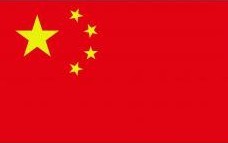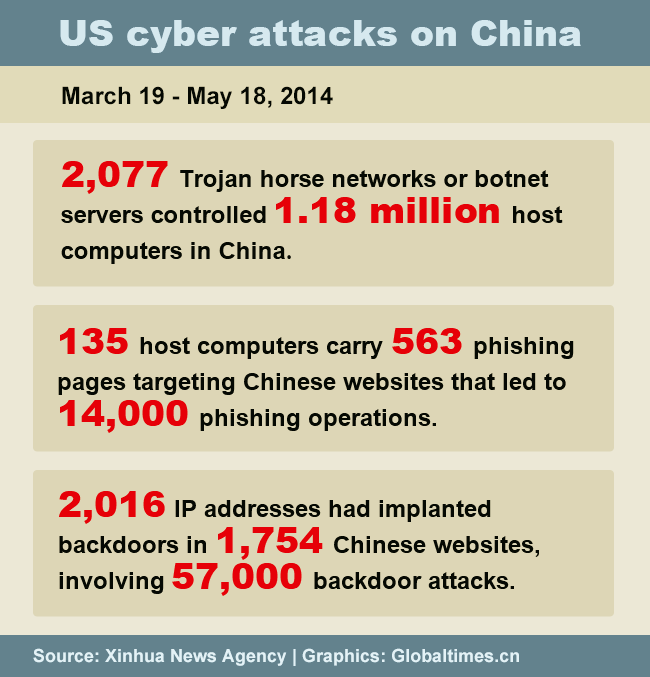SPECIAL COVERAGE >> Daily Specials
China protests US cyber-theft incitment
| Latest News |
Chinese envoy accuses US of hypocrisy on indicting Chinese for Internet espionage
Chinese Ambassador Cui Tiankai on May 20 accused the United States of hypocrisy for charging five Chinese nationals of alleged commercial espionage, citing Edward Snowden's revelations of US spying operations worldwide.
China suspends cyber working group activities with US to protest cyber theft indictment
China on May 19 decided to suspend activities of the China-US Cyber Working Group as US announced indictment against five Chinese military officers on allegation of cyber theft.
China publishes latest data of US cyber attack
A spokesperson for China's State Internet Information Office on May 19 published the latest data of US cyber attack, saying that China is a solid defender of Internet security.
China summons US envoy over hacking claims
FM slams US hacking indictment
China summons US ambassador over indictment against Chinese military officers
China strongly opposes US indictment against Chinese military personnel
| Voices |
 | Qin Gang, China's foreign ministry spokesperson, said in a statement late on May 19 that the US accusation was "made up" and would "damage Sino-US cooperation and mutual trust." "The Chinese government's stance on the issue of Internet security is consistent and clear," said the statement, which urged "immediate rectification." "China is a staunch defender of network security, and the Chinese government, military and associated personnel have never engaged in online theft of trade secrets," it said. Chinese Defense Ministry spokesman Geng Yansheng said the US side has adopted double standards on cyber security and the Chinese military is also a victim of cyber theft. "It's really amazing to see that some people still believe they have moral high ground and credibility to accuse others, if we consider the Snowden revelations... It's a bit incredible," Chinese Ambassador to US Cui Tiankai said in an exclusive interview with the US TV network CNN. |
 | "This is a case alleging economic espionage by members of the Chinese military," US Attorney General Eric Holder said as he unveiled charges by a grand jury in Pennsylvania, reported AFP. The hackers targeted US companies in the nuclear power, metals and solar products industries to steal information useful to competitors in China, the US Department of Justice (DOJ) said on Monday. The companies targeted include Alcoa Inc, United States Steel Corp, Allegheny Technologies Inc, Westinghouse Electric Co and US subsidiaries of SolarWorld AG, US officials said. The hackers also targeted United Steel, Paper and Forestry, Rubber, Manufacturing, Energy, Allied-Industrial and Service Workers International Union (USW), officials said. |
| Infographic |

| Comments |
Global Times
Washington plays victim of espionag
It appears that Washington has mistaken its domestic law for a law applicable to the international community by directly indicting active-duty Chinese army officers. It has severely infringed their human rights. Despite the relatively weak awareness and ability of Chinese to safeguard their legal rights, the five officers should file a lawsuit against the US government for damaging their reputation.
| Similar Allegations |
| Time |  |  |
| November 7, 2013 | In a draft of an annual report by the US-China Economic and Security Review Commission to Congress, it says there are "no indications the public exposure of Chinese cyber espionage in technical detail throughout 2013 has led China to change its attitude toward the use of cyber espionage to steal proprietary economic and trade information." | "Under the circumstances of the spying scandal, should the United States have real interests on cyber security, it should not beat around the bush," said Chinese Foreign Ministry spokesman Hong Lei. |
| May 7, 2013 | In its annual report to Congress on Chinese military developments, the Pentagon said the US government continues to be targeted with (cyber) intrusions, "some of which appear to be attributable directly to the Chinese government and military." | "Although it is common sense that you cannot determine sources of cyber attacks only through IP addresses, some people in the Pentagon still prefer believing they are from China as they always bear a sense of rivalry," Wang Xinjun, a researcher with the Academy of Military Sciences of the Chinese People's Liberation Army said. "It is an allegation based on presupposition." |
| February 18, 2013 | In a report released February 18, 2013, Internet security firm Mandiant pointed its fingers at a Chinese military unit named People's Liberation Army (PLA) Unit 61398, saying the Shanghai-based outfit had systematically stolen confidential data from at least 141 organizations across 20 industries. | Foreign Ministry spokesman Hong Lei on February 19, 2013 said allegations of Chinese hacker attacks are groundless, reiterating the government's position on fighting cybercrime. |
| January 30, 2013 | The New York Times and Wall Street Journal claimed that they had detected cyber attacks from China-based hackers, while China had been regularly labeled a major origin for cyber threats to the United States. | Hong Lei, spokesman of the Ministry of Foreign Affairs, responded that "the conclusion that China participated in related cyber attacks based on unverified evidence is irresponsible," adding that China was also a victim and Chinese law strictly forbids Internet attacks. |
| November 14, 2012 | According to US commission's annual report, the commission urged tighter screening of investment by Chinese State-owned companies in the US, and recommended that the US Congress conduct an in-depth assessment into "Chinese cyber espionage practices." | "This commission always sticks to the Cold War mentality," Hong Lei said at a regular press briefing in reference to an annual publication released by the US-China Economic and Security Review Commission the same day. |
| June 2, 2011 | In a blog post updated, Google said a clandestine campaign originating in China targeted some users of Gmail, its e-mail service, aiming at stealing passwords and monitoring e-mail accounts. | Google lacked evidence to support its accusations that Chinese hackers are behind the alleged cyber attacks on hundreds of its email accounts and the timing to make such accusations is evil-intentioned, Chinese experts said. |
| April 1, 2010 | Symantec, an Internet security giant headquartered in California, said in its March report that individuals in China were responsible for 28.2 percent of e-mail attacks, which was cited as a major source of malware. | A Chinese Foreign Ministry spokesman rejected claims that most email-based malware targeting the US originated in China. |
| January 17, 2010 | The New York Times has filed two reports claiming the cyber attacks on Google and other US firms last year have been traced to Shanghai Jiaotong University (SJTU) and Lanxiang Vocational School. | "Investigation in the staff found no trace the attacks originated from our school," Li Zixiang, Party chief at Lanxiang Vocational School in Shandong Province, told Xinhua. |
| Related News |
China world's biggest cyber attack victim, says report
China's Baidu sues US company over cyber-attack
Regular cyber attacks from US: China
China, US discuss cyber security
US, China both face cyber security threats: Pentagon chief
Web editor: gelili@globaltimes.com.cn